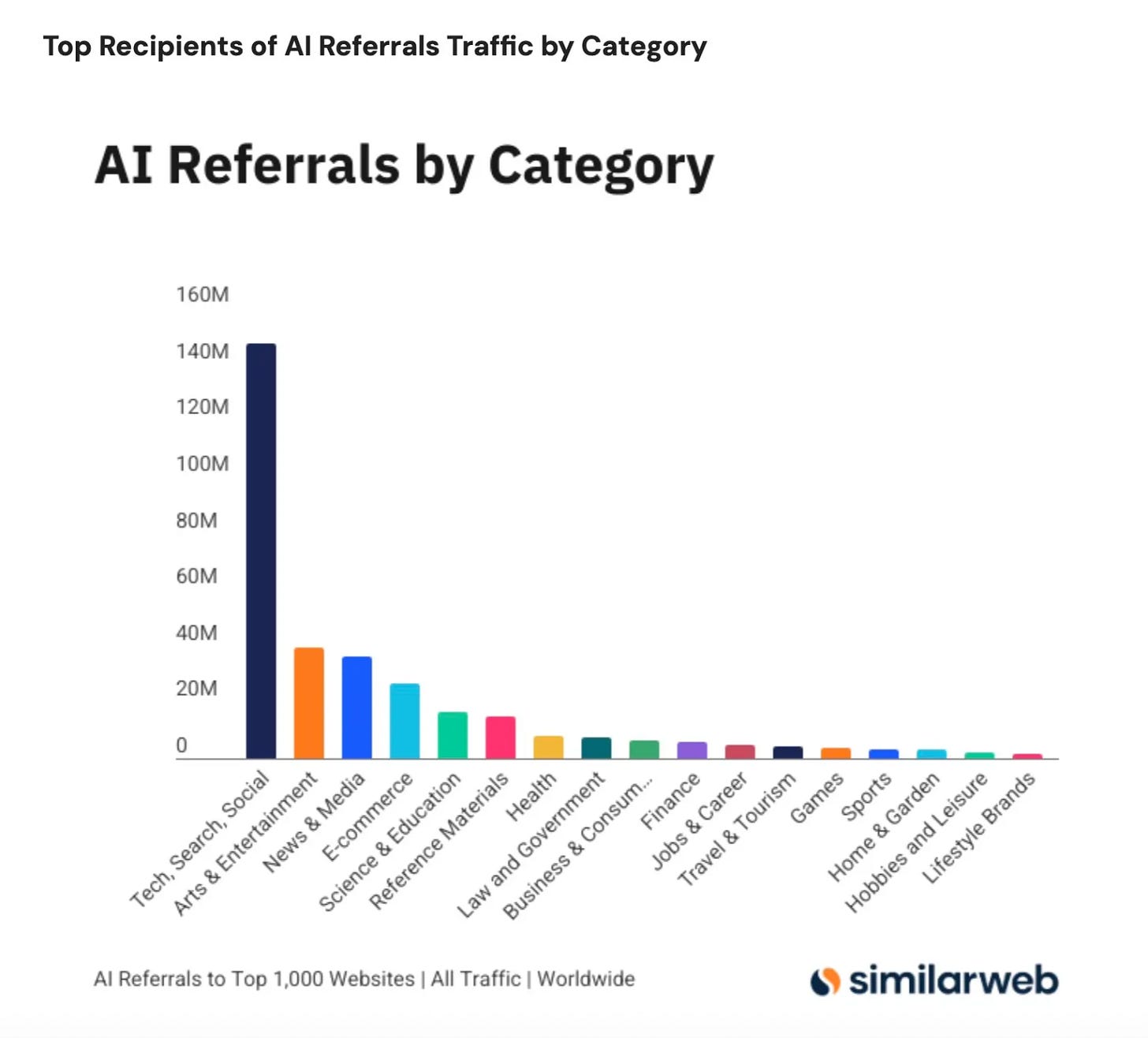No big new model or feature announcements this week, but lots of great reporting around the transition to Web 4.0, and the Trump administration set out their stall on AI with their AI Action Plan and three related executive orders.
In Ethics News, it was reported that OpenAI have signed an agreement with the UK Government to help them identify use cases for their technology, and during a ‘vibecoding’ session at Replit, the AI accidentally deleted their entire codebase.
There’s also a great interview with Google DeepMind CEO Demis Hassabis on the Lex Fridman podcast that’s worth checking out too.
Web 4.0 Update
As we get into the transition to Web 4.0 we’re starting to see more research and reporting around some of the key indicators, which is great to see. Lots to share on this front this week, which I’ve summarised and linked to below.
On Wednesday, on their Q2 earnings call, Google started sharing a new narrative around AI and Search. According to Sundar Pichai, AI is encouraging people to search more, ask new kinds of questions, and engage more deeply with their platform. Apparently AI features are driving “over 10% more queries globally” for Google. Alongside this, Google shared that AI Overviews now has 2bn monthly users across more than 200 countries and territories. They also shared that their new AI Mode currently has 100m monthly users in the US and India, despite not being fully rolled out yet. Lastly, it’s worth noting that Google’s search revenue is up 12% YoY at a staggering $54bn for Q2 alone.
We also got some updated numbers from OpenAI this week - ChatGPT users send over 2.5 billion prompts every day, which is up from a reported 1bn daily prompts just 8 months ago. To put this in perspective, that’s about a sixth of the volume that Google handles, but OpenAI have grown this volume in just over 2.5 years vs. Google’s 25 years. Whether it’s the growth of ChatGPT or Google’s search platform, it’s clear the nature of search is changing dramatically. This means more information directly summarised for the user and fewer links/clicks directly through to content. In turn this means lower traffic volumes to publishers, and less diversity for consumers.
The last bit of news comes from Similarweb, who released data that shows for the top 1,000 global websites, referrals from AI platforms has grown 357% in the last 12 months. This is a lot of growth, but it’s coming from a small base so still only represents less than 1% of the referrals from Google Search. However, when you break this down by category, the referral growth for news websites was 770%, and the tech sector sees nearly 4x the volume of the next biggest category. Similarweb also shared that ChatGPT dominates AI referrals, accounting for a staggering 80% of all referrals.
As more research and reporting happens around the transition to Web 4.0 I’ll share more, so expect this Web 4.0 section to become a semi-regular feature of The Blueprint going forwards.
Trump’s AI strategy trades guardrails for growth in race against China
Trump gave his first major speech on AI this week, announcing the US AI Action Plan and signing three big executive orders on AI.
The AI Action Plan firmly positions AI as a race that will reshape the global economy, with removing barriers to innovation at the heart of the plan.
A big part of this is an acceleration in building out even more AI infrastructure (data centres, chip manufacturing, and new power generation), which is what the first executive order is aimed at - removing red tape in the permitting and building process for this infrastructure.
Another is the desire for the US AI tech stack to be the dominant global tech stack, which is the focus of the second executive order - promoting the export of the US AI tech stack, which is in stark contrast to the previous administration’s approach.
The third executive order bans the federal government from using “Woke AI” (whatever that is). The Trump administration wants AI models that enforce the US (his?) ideological bias on the world and discourages tech companies from writing DEI into their models, which is something the Biden administration encouraged.
If you want to learn more, you can read more about all the announcements and news below:
Trump’s AI strategy trades guardrails for growth in race against China
Trump’s ‘anti-woke AI’ order could reshape how US tech companies train their models
The White House orders tech companies to make AI bigoted again
Unitree introduces R1
I’m not sure what’s more impressive - the moves that the Unitree R1 can perform or the base model’s price being under $6k!
But as Jim Fan pointed out, robotics is seeing its own version of Moravec’s paradox - robots find it ‘easy’ to perform complex movements that humans find hard, but at the same time find it ‘hard’ to perform movements we find simple. So whilst the R1 can perform cartwheels and hand stands, it still struggles to do the dishes.
AI Ethics News
OpenAI signs deal with UK to find government uses for its models
Sam Altman warns there’s no legal confidentiality when using ChatGPT as a therapist
Replit’s AI Agent Wipes Company’s Codebase During Vibecoding Session
Subliminal Learning: Language Models Transmit Behavioral Traits via Hidden Signals in Data
Long Reads
Stratechery - Content and Community
Lex Fridman Podcast - Demi Hassabis: Future of AI, Simulating Reality, Physics and Video Games
“The future is already here, it’s just not evenly distributed.“
William Gibson





